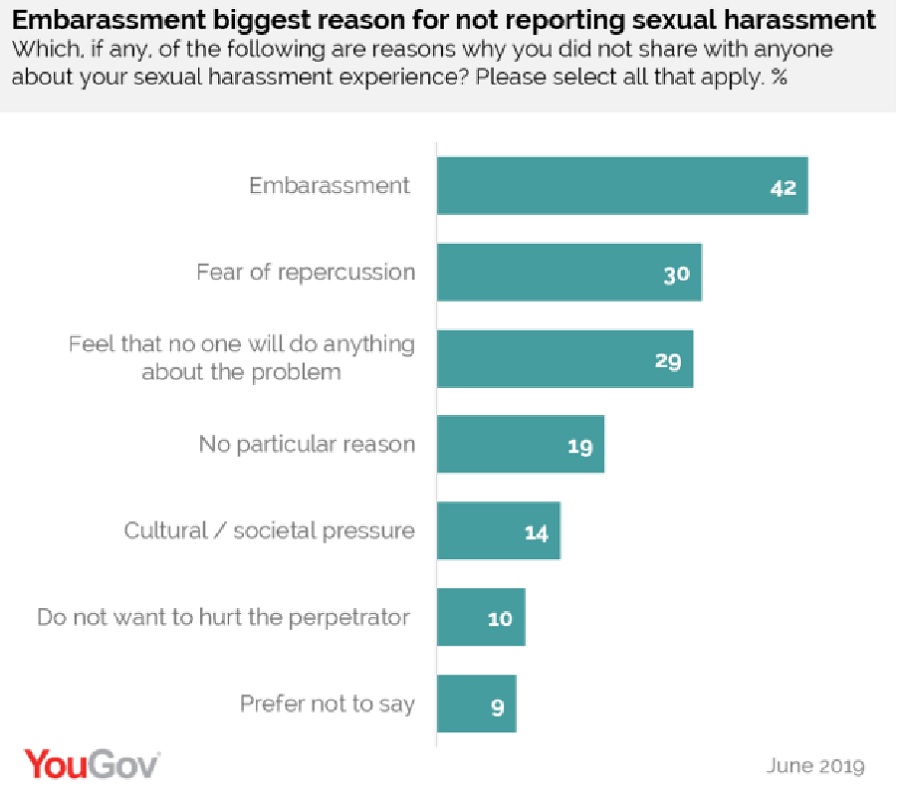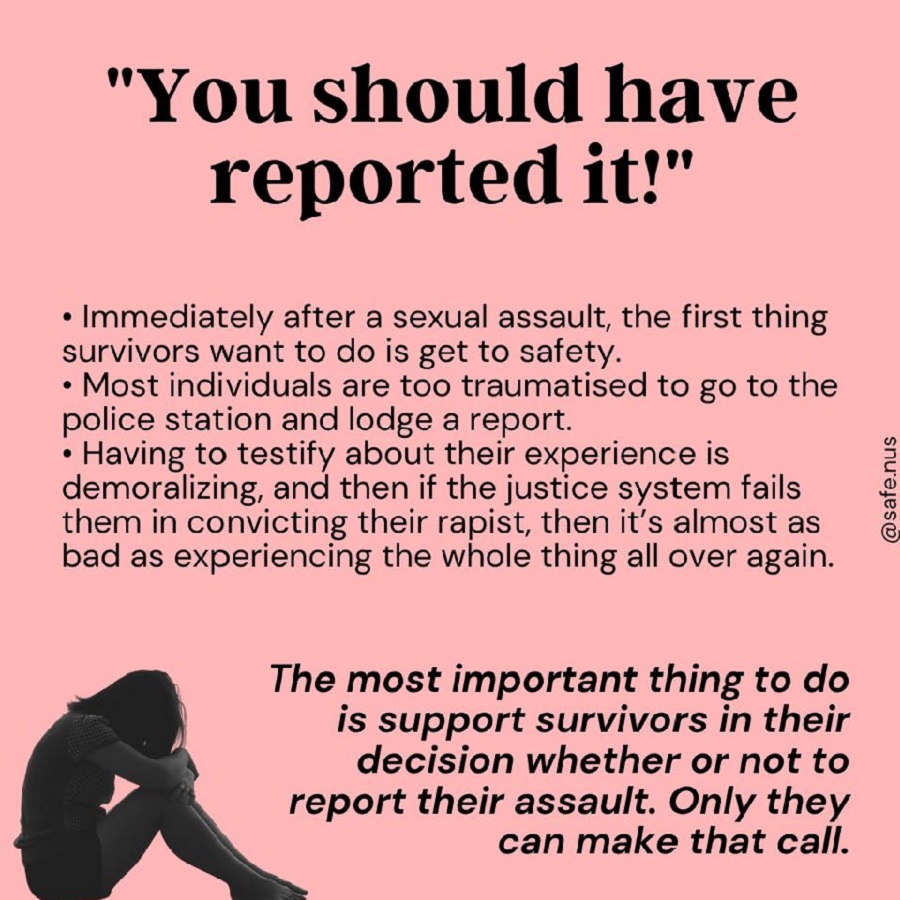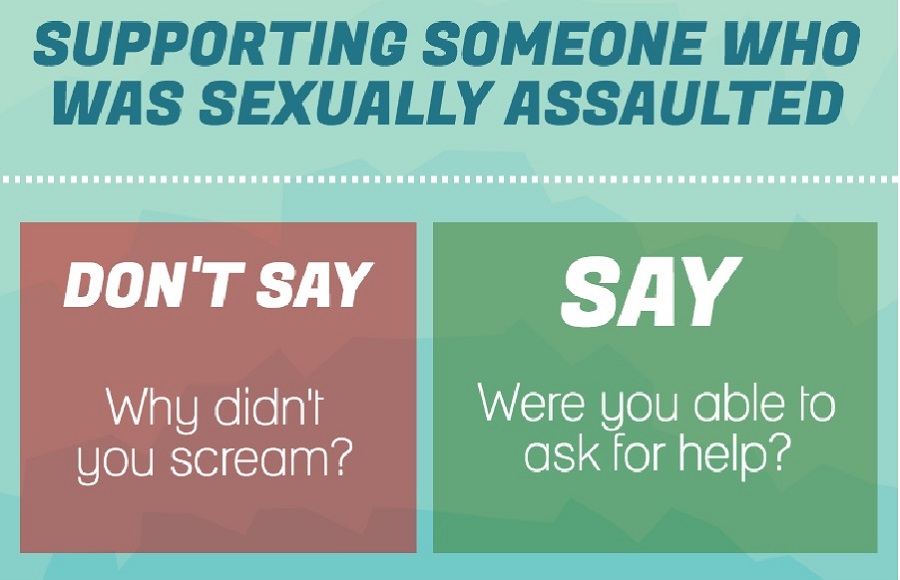Fill Me In
When Tarana Burke started the Me Too movement in 2006 to support sexual violence survivors, little did she know it will become viral more than a decade later.
In 2017, when American film producer, Harvey Weinstein, faced a series of sexual assault allegations against him, many celebrities came forward to share their stories.
The #MeToo movement spread worldwide thereafter. Though the movement gave power and voices to sexual assault survivors, many are still hesitant to share their stores.
According to a research by YouGov Ominbus in June 2019, a quarter (26%) of Singaporean women have experienced sexual harassment, as compared to one in ten (9%) men. 1,045 Singaporeans were surveyed for this research. Only 52% out of those who have faced sexual harassment reported or told someone about the incident.
The most commonly experienced form of sexual harassment faced is sexual assault (61%). While sexual assault cases should be made known, 42% of the respondents choose the alternative route due to embarrassment.

Why sexual assault cases go unreported
According to the Association of Women for Action and Research (AWARE), survivors don’t report these incidents as they are concerned about how officials will treat them, the lack of confidence in legal justice and/or worry about further victimisation and stigmatisation.
Very often, fingers are pointed at the survivors instead of perpetrators. This is known as victim-blaming.
When interviewed by TodayOnline, Dr Kim Lian Rolles-Abraham, a senior clinical psychologist at Better Life Clinic who sees sexual assault survivors, said that victim-blaming occurs when people try to rationalise away the behaviour of the culprit by attributing part or all of the blame on the victim.
Victim-blaming is also known as the ‘second wave of trauma’. Victims start to feel guilty or ashamed when others blame them for the assault that had happened. When self-doubt surfaces, they find it harder to process what had happened, resulting in a disruption to their recovery process.
Things to avoid saying to sexual assault survivors
To prevent victim-blaming from surfacing, here are some things one should avoid saying to sexual assault survivors.
‘You should have reported it’
Sexual assault cases are often complicated, especially when the perpetrator is someone close to you, such as a family member or a friend.
As shared by safeNUS, the first thing survivors want to do is to get to safety. Many are too traumatised to lodge a police report. The most important thing is to support the decisions which the survivors make, as they are the only ones who can make the call.

‘You’ve been acting like this for a while now’
The recovery process for survivors is a long journey. As we express our concerns towards them, the last thing they want to hear is your patience wearing off.
According to experts at Rape, Abuse and Incest National Network (RAINN), one should avoid judgment when speaking to survivors.
Though it’s tough to see them struggle with the aftermath for a prolonged period, avoid phrases which suggests that the recovery process is long.
‘Why didn’t you scream?’
The term, ‘freezing’, is used to describe a type of reaction a person experience during a traumatic event. Various forms of temporary paralysis, such as going numb or the inability to make a sound, may occur to the person who is facing danger.
According to AWARE, going physically, emotionally and mentally numb are survivors’ attempt to protect themselves from feeling the full extent of the trauma.
As ‘freezing’ is not a conscious choice, questioning survivors as to whether they fought back against their perpetrators should be avoided.

How to show support towards sexual assault survivors
Encouraging words can go a long way for sexual assault survivors. It helps them gather the courage to share their stories.
Here are some words of encouragement which you can use to show your support:
‘I’m here for you’
Reassuring words gives strength to survivors, for they know that they’re not alone in this fight.
When interviewed by the New York Times, psychotherapist Beverly Engel recommended that one should ask the survivor if they would like physical contact, such as holding hands, as they share their story. This is especially so if the survivor is your significant other. But otherwise, the default is to give them physical space while they speak. This is because reliving the event itself can be emotionally daunting.
‘How can I help you?’
When one offers support to the survivors, it helps them cope better with the incident.
While family and friends can offer support, it’s advisable for survivors to reach out to professionals and support groups.
This is a useful approach as survivors get an objective perspective from a trained professional. They will not feel like their friends or family members are compelled to sympathise with them.
Being a pillar of support to someone in need is important, for it helps survivors to emerge as a stronger individual from the experience. Don’t hesitate to reach out at these helplines if you or someone you know require emotional or psychological support.
Helplines
- AWARE’s Sexual Assault Care Centre: 6779 0282
- Centre for Promoting Alternatives to Violence (PAVE): 6555 0390
- Samaritans of Singapore (SOS): 1800 221 4444
Join the conversations on THG’s Facebook and Instagram, and get the latest updates via Telegram.




























